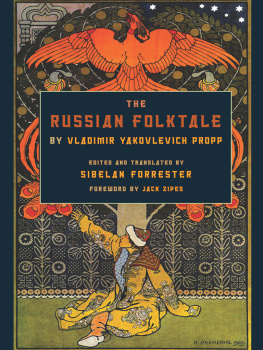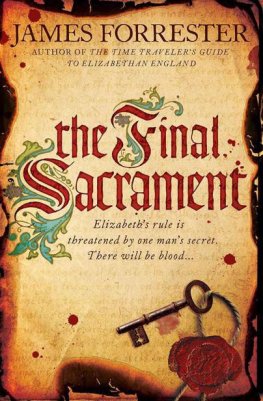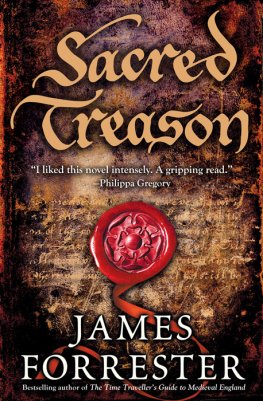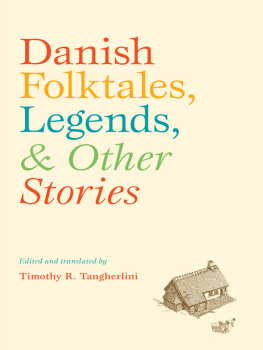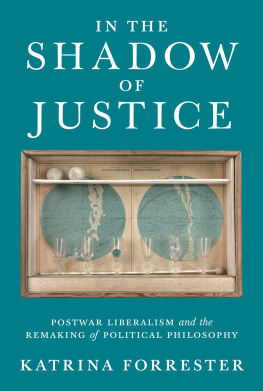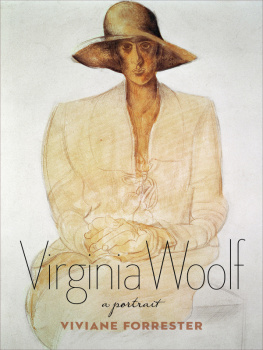THE COMPLETE FOLKTALES OF
A. N. Afanasev
Volume III
THE COMPLETE FOLKTALES OF
A. N. Afanasev
Volume III
Edited by
Jack V. Haney and Sibelan Forrester
University Press of Mississippi * Jackson
The University Press of Mississippi is the scholarly publishing agency of the Mississippi Institutions of Higher Learning: Alcorn State University, Delta State University, Jackson State University, Mississippi State University, Mississippi University for Women, Mississippi Valley State University, University of Mississippi, and University of Southern Mississippi.
www.upress.state.ms.us
Designed by Peter D. Halverson
The University Press of Mississippi is a member of the Association of University Presses.
Copyright 2021 by University Press of Mississippi
All rights reserved
Manufactured in the United States of America
First printing 2021
Library of Congress Cataloging-in-Publication Data
Afanasev, A. N. (Aleksandr Nikolaevich), 18261871.
[Narodnye russkie skazki. English]
The complete folktales of A.N. Afanasev / edited by Jack V. Haney.
volumes ; cm
Includes bibliographical references.
ISBN 978-1-62846-093-3 (cloth : alk. paper)
ISBN 978-1-62846-094-0 (ebook)
1. TalesRussia. I. Haney, Jack V., 1940 editor. II. Title.
GR202A4313 2014
398.20947dc23 2014014293
British Library Cataloging-in-Publication Data available
published with a grant from Figure Foundation
For Alethea
and
Phoebe
CONTENTS
TALE NUMBER | TITLE |
APPENDIX I
Tales Removed by the Censor from the Collection Russian Folktales |
APPENDIX II
Tales from the Collection Russian Forbidden Tales and from the Manuscript Russian Folktales Not for the Press |
NOTE TO VOLUME III
T HIS VOLUME FOLLOWS THE FORMAT OF VOLUMES ONE AND TWO of A. N. Afanasevs The Complete Folktales, published by the University Press of Mississippi. The tales are presented in the order in which they appear in the 1986 edition by L. G. Barag and N. V. Novikov, Narodnye russkie skazki A. N. Afanaseva v trekh tomakh, Tom III. This volume contains tales numbered 319579 and forty-five additional tales from among those denied publication by the Russian censors. I have restored the text omitted by the Russian censors from Narodnye russkie skazki ne dlia pechati, Moscow, 1997. If the tale was translated either from Belarusian or Ukrainian and not Russian, this fact is noted in the commentaries. Each commentary notes the Aarne-Thompson (Uther) number establishing the international classification of the tale, except that the Russian SUS number is given where there is no ATU number or where the Russian number differs from the ATU number. The commentaries contain information about each tale, how many versions have been recorded in Russian, Ukrainian, or Belarusian (the three East Slavic languages), its distribution worldwide, often the ATU number of that tales analogue in the German collection of the Grimms, and occasionally information pertinent to the particular tale. An index lists the tales in the three volumes by tale type.
This is the appropriate time to express my gratitude to Craig Gill, assistant director and editor-in-chief of the University Press of Mississippi and his staff, and to Lisa Paddock, the copyeditor of these three volumes, for their unflagging support of my project to bring the magnificent collection of folktales of A. N. Afanasev to the English-reading public. It has been my great pleasure to work with them. I also thank members of my family for their assistance and support: my wife, Barbara; Andrew and Gillian, and Gillians husband, Ted. The entire project has been dedicated to my granddaughters, Alethea and Phoebe, but also to lovers of the folktale more widely as well.
JACK V. HANEY, 2015
Jack Haneys translations of the folktales in Afanasevs collections, and of other materials, too, have been a fundamental contribution to folklore studies and to readers interested in any aspect of Russian culture. It was an honor to be asked to edit the drafts of the third volume of Afanasevs folktales. Some of Dr Haneys drafts were complete, while others were missing sections or (rarely) not even started. I may have changed things in a way he would not have chosen, but I hope the result will harmonize with the first two volumes.
I wish to thank Olga Bukhina (always a valuable interlocutor about translation, especially translation from Russian), and the good people at the University Press of Mississippi, especially Katie Keene and Craig Gill. My daughter Raian was superbly patient as I worked on the editing in the summer of 2019.
SIBELAN FORRESTER, 2020
- GLOSSARY -
Arshin:Measurement of length equal to twenty-eight inches
Ataman:Headman of the Cossacks
Baba Yaga (also Yaga, Yagishna, etc.):Russian witch; may be plural
Bathhouse:Site of much magic and skullduggery
Bogatyr, female Bogatyrka:Russian warrior hero, heroine
Boyar:Russian nobleman; confidant of the tsar
Bread and Salt!:Traditional greeting and offer of hospitality
Chervonets:Gold coin worth ten rubles
Chudo-Yudo:Ogre
Elder:Usually solitary Orthodox leader; mystic
Green Wine:Vodka (distilled in copper vats)
Guberniia:Province of Imperial Russia
Gusli:Plucked instrument
Hegumen:Head of Orthodox monastery
Kaftan:Long cloak associated with merchants
Kopeck:Coin, one hundred equal one ruble
Muzhik:Legal peasant, but not always working the land
Name day:Saints Day, celebrated instead of birthday
Prosfira:Leavened communion bread in Orthodox Church
Sazhen:Measure of length; 2.13 meters
Stove:Heart of the peasant home
Tsar, Tsaritsa (Tsarina):Russian ruler and his wife
Tsarevich, Tsarevna:Tsars son, tsars daughter
Unclean one, spirit:Euphemisms for the devil
Verst:Measure of length equal to thirty-five hundred feet
Voevoda:Military governor
The Tales
Shemiakas Court
319.
In certain areas there lived two brothers: one was rich, while the other was poor. The poor brother came to the rich one to ask to borrow a horse, so he could drive into the forest for wood. The rich brother gave him a horse. The poor man then asked for the horse collar. The rich man was most indignant with his brother and refused to give him the collar. The poor brother got the idea to tie the cart to the horses tail, and he set off into the woods for firewood. And he cut a huge load, as much as the horse could pull, and then he drove to his own yard and opened the gates, forgetting to remove the bottom board from its place. The horse rushed over the bottom board of the gates and tore off its tail. The poor brother thus led the horse back to the rich brother without its tail. The rich brother saw the horse without a tail, refused to accept the horse, and went to Shemiaka the judge to lodge a complaint against the poor man. The poor man, realizing that misfortune had come to him, knew he would be summoned. It has long been noted that the naked man has nothing to give to the messenger, so the poor brother set out after his brother.



